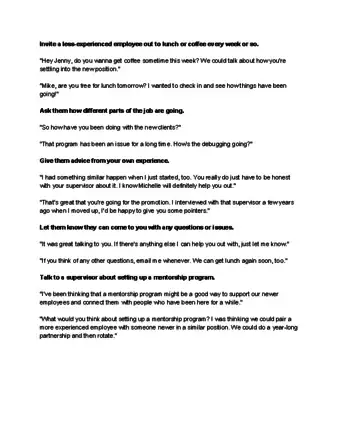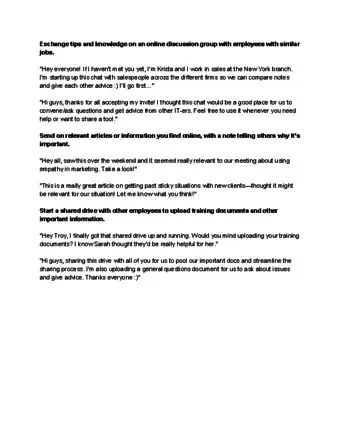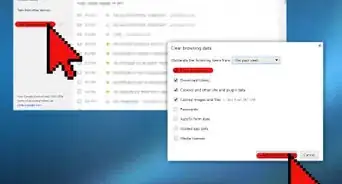This article was co-authored by Jessica Elliott, ACC, CEC. Jessica Elliott is a Certified Executive Coach and multi-passionate entrepreneur. She's the founder of LIFETOX, where she hosts mindful experiences and retreats, and J Elliott Coaching, which she provides executive consulting for professionals, teams, and organizations. Jessica has had over fifteen years experience as an entrepreneur and over five years of executive coaching experience. She received her ACC (Associate Certified Coach) accreditation through the International Coaching Federation (ICF) and her CEC (Certified Executive Coach) accreditation through Royal Roads University.
This article has been viewed 22,354 times.
In any office or workplace setting, it’s important for employees to share professional knowledge and skills with one another. Companies that encourage knowledge sharing generally see an improvement in the quality of work that employees produce. Sharing knowledge can also lead to a less competitive, friendlier company environment.[1] To share knowledge at work, look for ways in which you can pass information and expertise on to your co-workers both online and in person.
Steps
Sharing Knowledge Digitally
-
1Share data files with your co-workers. Individual data files are often kept private (e.g., on an employee’s hard drive). However, private use of data files can prevent knowledge from being shared. So, utilize a local shared file system or an intranet that all employees can access, and keep data files on that shared drive.[2]
- This system allows employees to benefit from the work and knowledge that their co-workers have already done.
-
2Create an online discussion group for other employees with similar jobs. Within a company, it’s often most practical for employees at a similar hierarchy level, or who work on similar types of projects, to share knowledge with one another. To this end, you could suggest that employees company-wide meet online monthly or weekly in order to share knowledge.[3]
- For example, if you’re a mid-level IT manager who works with the Sales department of a company, suggest that all other mid-level IT managers from different departments contribute to the online discussion group.
- This could take the form of a weekly webinar or group Skype session in which employees can chat and share problem-solving techniques, or other kinds of professional knowledge.
Advertisement -
3Distribute new information that you encounter online. The information that you share in your workplace doesn’t have to come only from your personal expertise. If you encounter an online blog post, article, video, or tutorial that you think would benefit others in your workplace, send the link out electronically.[4]
- Send your co-workers an email that links to an informative article or website. In the body of the email, write something like, “Hi everybody, the linked article provides some useful information on effectively closing sales deals. Hope it helps!”
-
4Create and distribute written training documents. A great way to disseminate workplace knowledge is through writing documents and uploading them online. Think back on personal workplaces experiences, and write about the knowledge that you’ve gained. The written documents could take the form of text files on an employee-only intranet, or professional blog posts on a site accessible to anyone in your industry.[5]
- For example, if you’ve worked in the restaurant industry for over 10 years, you could put together training documents for new hires at every level of the restaurant you work at, from busboys to chefs.
- Or, if you’ve worked as a business project manager, type up a weekly blog detailing solutions to common problems that other project managers may face.
Sharing Knowledge in Person
-
1Discuss office best-practices in shared social spaces. While it’s useful to share knowledge online, nothing beats the casual spontaneity of a face-to-face conversation. Take advantage of shared office social spaces, like a break room or lunch area, to strike up conversations about workplace practices. Social knowledge sharing can also help the workplace feel more communal.[6]
- Try saying something like, “Hi Jim, if you have a minute to talk, I learned a new trick recently that might help with that budget renovation you’re working on. It seemed like it’d be pretty useful.”
-
2Set an example of open communication in the workplace.[7] If you work in an office which hasn’t always encouraged knowledge sharing, take it upon yourself to set a precedent for others to follow. This is especially important if you’re a supervisor or an experienced employee. Leading by example and sharing knowledge with your employees or less-experienced workers will encourage them to share knowledge among themselves as well.[8]
- For example, you could open a meeting by saying something like, “I’ve been thinking about all of the expertise that we have individually. It would be great if we could all share that expertise with each other. I’ll start; let me share a few tricks I’ve picked up over the years that I think might help a few of you.”
-
3Mentor a younger employee. Employees who have been at a company 5 years (or more) have built up a wealth of knowledge that will be invaluable to newer employees. Mentors and their mentees should have similar jobs within a company or at least work on similar types of projects. You and a mentee could meet weekly and discuss best practices in the workplace and ways to troubleshoot common problems specific to the job.[9]
- If your company doesn’t already have a mentorship program in place, talk to your supervisor about setting up a program. For example, each new employee could be paired with a mentor for a 1-year period.
-
4Share your knowledge through monthly presentations or talks. Company meetings are a great venue for employees to share knowledge with one another. Or, if a company meeting would be too large, set up a meeting for 5-10 people who work in a similar field within the company. Share a few tricks and tips that you’ve picked up over the years, and ask your co-workers to do likewise in future meetings.[10]
- For example, if you work in the publishing industry and are an expert at book layout or cover design, put together a 30-minute presentation that covers the basics of what you do.
-
5Present at a conference or a trade show. While an intra-company presentation can benefit your co-workers, if you’d like to share knowledge with people throughout your industry, you could present at a nationwide conference. Most professional industries have annual or semi-annual conferences. If you haven’t attended one before, ask your supervisor if they can recommend a professional conference or provide funding.[11]
- Remember that part of sharing knowledge is being open to receiving new knowledge yourself. So, don’t talk down to the attendees at your presentation.
- Instead, once your talk has concluded, ask if any of the audience members have suggestions as to how you could improve your current practices.
Help Sharing Knowledge
References
- ↑ https://www.entrepreneur.com/article/252486
- ↑ https://www.entrepreneur.com/article/252486
- ↑ https://www.entrepreneur.com/article/252486
- ↑ https://www.forbes.com/sites/work-in-progress/2013/07/25/5-ways-to-share-your-professional-expertise-and-4-reasons-you-should/2/#6c21fd271b9d
- ↑ https://www.forbes.com/sites/work-in-progress/2013/07/25/5-ways-to-share-your-professional-expertise-and-4-reasons-you-should/2/#217535a871b9
- ↑ https://economictimes.indiatimes.com/jobs/5-ways-to-promote-knowledge-sharing-at-the-workplace/articleshow/55614829.cms
- ↑ Jessica Elliott, ACC, CEC. Certified Executive Coach. Expert Interview. 12 February 2020.
- ↑ https://economictimes.indiatimes.com/jobs/5-ways-to-promote-knowledge-sharing-at-the-workplace/articleshow/55614829.cms
- ↑ https://www.forbes.com/sites/work-in-progress/2013/07/25/5-ways-to-share-your-professional-expertise-and-4-reasons-you-should/




































































